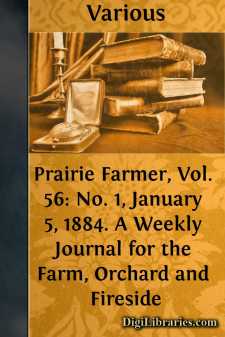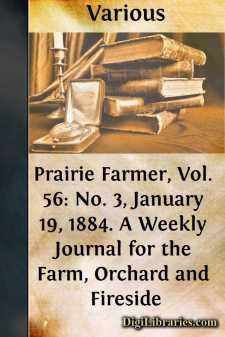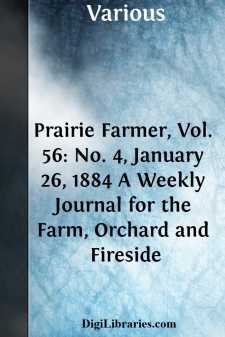Categories
- Antiques & Collectibles 13
- Architecture 36
- Art 48
- Bibles 22
- Biography & Autobiography 815
- Body, Mind & Spirit 144
- Business & Economics 28
- Children's Books 18
- Children's Fiction 14
- Computers 4
- Cooking 94
- Crafts & Hobbies 4
- Drama 346
- Education 58
- Family & Relationships 59
- Fiction 11834
- Games 19
- Gardening 17
- Health & Fitness 34
- History 1378
- House & Home 1
- Humor 147
- Juvenile Fiction 1873
- Juvenile Nonfiction 202
- Language Arts & Disciplines 89
- Law 16
- Literary Collections 686
- Literary Criticism 179
- Mathematics 13
- Medical 41
- Music 40
- Nature 179
- Non-Classifiable 1768
- Performing Arts 7
- Periodicals 1453
- Philosophy 65
- Photography 2
- Poetry 896
- Political Science 203
- Psychology 44
- Reference 154
- Religion 515
- Science 126
- Self-Help 85
- Social Science 83
- Sports & Recreation 34
- Study Aids 3
- Technology & Engineering 59
- Transportation 23
- Travel 463
- True Crime 29
Sort by:
by:
Various
Prof. John W. Robson, State Botanist of Kansas, sends The Prairie Farmer an extract from his last report, concerning a tame grass for hay and pasturing which is new to that State. The grass has been on trial on an upland farm for two years, during which time he has watched it very closely. The Professor says, "It possesses so many excellent qualities as to place it in the front rank of all...
more...
by:
Various
Editor Prairie Farmer—I write you in regard to the corn question. I would like to know if angle-worms damage corn. Eight years ago I came to the conclusion that I could raise double the number of bushels of corn that I was then raising. I then commenced experimenting on a small scale. I succeeded very well for the first three or four years. I got so that I could raise over ninety bushels per acre. In...
more...
by:
Various
There are two causes of failure to make this crop uncertain. One is because the soil is not kept clear of weeds, and the other is that it is not properly enriched. To raise a good crop of onions requires a light, loamy soil, worked into as fine a condition as possible, to render cultivation easy. The greater part of the preparation should be done in the fall, and especially the application of the...
more...
by:
Various
Mr. Punch, on the strength—or, rather, length—of a Message from President Pierce, visited her Majesty Queen Mab. He was received by a most courteous Dream-in-Waiting, who introduced him through the Gate of Horn, whence, as Colonel Sibthorp beautifully remarks,"Veris facilis datur exitus Umbris."Dream-World was merrily keeping its Yule-tide, with shadowy Sports and dissolving Pastimes. As...
more...
by:
Various
INTRODUCTION. The Old Year was fast nearing its close, the night was clear and starry, and Father Time, from the top of his observatory tower, was taking a last look round. To him entered, unannounced save by the staccato yap of the faithful Tobias, Time's unfailing friend, unerring Mentor, and immortal contemporary, Mr. Punch. "I am not for an age, but for All Time," freely quoted the...
more...
by:
Various
December 9, 1914. We are told that "it is confidently believed by the advisers to the Treasury that the new issue of £1 notes cannot be successfully imitated." We think that it is a mistake to put our artists on their mettle in this way. A black eagle, a contemporary tells us, was seen one day last week at Westgate-on-Sea. A Prussian bird, no doubt, in mourning for lost Calais. The German...
more...
by:
Various
December 23, 1914. An exceptionally well-informed Berlin newspaper has discovered that, owing to the war, Ireland is suffering from a horse famine, and many of the natives are now to be seen driving cattle. An appeal is being made in Germany for cat-skins for the troops. In their Navy, on the other hand, they often get the cat itself. In offering congratulations to the "Green Howards" on the...
more...
by:
Various
December 16, 1914 T. P.'s Weekly, in some sprightly lines, suggests that Punch should appear daily. This would certainly not be a whit more strange than to issue a T. P.'s Weekly Christmas Number as is done by our contemporary. Answer to a Correspondent.—Yes, khaki is the fashionable colour for plum-puddings for the Front. Post hoc propter hoc? Extract from the Eye-Witness's...
more...
by:
Various
July 8, 1914 Lord Brassey is said to be annoyed at the way in which his recent adventure at Kiel was exaggerated. He landed, it seems, on the mole of the Kaiser Dockyard, not noticing a warning to trespassers—and certain of our newspapers proceeded at once to make a mountain out of the mole. Mr. Roosevelt's American physician, Dr. Alexander Lambert, has confirmed the advice of his European...
more...
by:
Various
November 11, 1914. "In Buenos Aires and other parts of Argentina," The Express tells us, "people are tired of the war, and a brisk trade is being done in the sale of buttons to be worn by the purchaser, inscribed with the words 'No me habla de la guerra' ('Don't talk to me about the war')." The Kaiser, we understand, has now sent for one of these buttons. The...
more...











